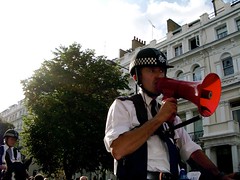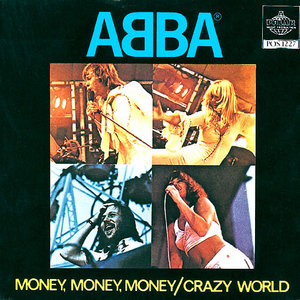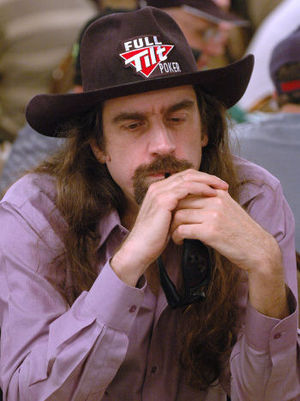 Image by Bahi P via FlickrPoker Tells: What Caro and Navarro Don't Tell
Image by Bahi P via FlickrPoker Tells: What Caro and Navarro Don't TellWhen I started playing poker I followed the basic concept of "fit or fold." This means that if your starting two cards hit the flop with a pair or better, or if it provided you with a draw, your hand is said to "fit" the board. If it did fit, you would have a reason to play on.
After a while, though, I realized that this fundamental approach to poker was really just a more advanced game of bingo.
Next, I learned about poker tells. My definition of a poker tell may be broader than most. I believe that a poker tell is anything your opponent does that provides a reliable signal to you about the strength of his hand.
Learning about poker tells and putting them into practice makes poker more fun and more profitable for me. I hope this article does the same for you.
Mike Caro and Joe Navarro: The Best at Providing Poker Tell AdviceI find that these two poker authors do an excellent job at providing poker players advice on tells.
Mike Caro's top advice is about how players tend to consciously act in a way opposite of their hand strength. Essentially, if a player acts strong, he is weak and if he acts weak, he is strong.
Joe Navarro uses his FBI background to provide advice on how players subconciously act in a way to give away their hand strength. Examples include watching an opponent's face for minor facial expressions.
Of course, when was the last time, Caro or Navarro won money in a poker game? Or, even played poker? And, if they are playing, how come they are not killing the competition?
My Recent Experience at the WSOPOn Day 6 of the Main Event, I was in the Amazon ballroom of the Rio. The Amazon room is the size of a football field. For the tournament, there is a large area set apart for the ESPN featured and secondary tables. I was seated at one of the other eight poker tables, spread out in the ballroom. What you don't see at home on TV are the camera crews, press and officials who surround these tables watching and recording the action.
When you get to the final 100 players there is quite a bit of pressure as every decision can cost you a shot at winning close to $9 million. Given the importance of every action at the table, things slow down. With those all-in decisions, your tournament life is at stake and the action stops as a player thinks. The ESPN cameras focus on the face of the players involved. Inevitably, one player will study his opponent for a long time. It can be a glance. It can be a glare. It can take minutes.
I found it funny.
I wasn't laughing inside at the importance of these decisions. What I was laughing about was how often a top professional player, who spent all this time studying his opponent, would make the wrong decision. It seemed that the more time the player studied an opponent, the more likely his read was wrong!
I found it very unfunny when I was sitting with pocket Kings, my opponent studied me for a long time, moved all-in with his Ace-Ten hand, and knocked me out with an Ace on the turn. Not funny at all.
Guidelines to Poker Tells That WorkFirst, I do not pretend to be the best poker player in the world. If I was the best poker player, my Kings would have held up.
Second, I promise you that these poker tells work for me but are based on
tournament poker.
Third, you have to decide what will work for you.
My advice is to take just one guideline at a time and try it out at your next game. Using poker tells is so much more fun, especially when you see the results in your bottom line.
Guideline #1. Look at your first two cards as soon as you get them, so you can study your opponents.Today, most players wait until the preflop action gets to them before they peek at their hole cards. I believe this is a mistake.
By looking at your cards right away it allows you to do the following:
-Study your opponents actions when they first see their hole cards. Often you will notice a slight difference when someone has pocket Aces.
-Gives you time to think over your decision before the action gets to you.
-Gives you an opportunity to provide a reverse tell to your aware opponents. Example: You can behave exactly as you have in the past when you folded to get action from the player to your right when you have a premium hand.
Guideline #2. Study the player to your left.This is obvious. Some unaware players tell you if they will fold or play pre-flop by their actions.
This is valuable when you are on the button or small blind. Notice any difference in how they hold their cards, where they place a chip to protect their cards, if they glance at their chips after looking at their cards, or anything that signals a change.
Of course, if they don't peek at their cards before you act, none of this will happen.
Guideline #3. Study the most aggressive player at your table and look for any difference in his actions.The most aggressive player will be the easiest to read as he will be the most active. This player will be the one you will most likely be playing hands again.
Watch to see if this player has any changes in his actions when he is in a hand. Does his pose change when the is strong or weak? Does the way he place his bets into the pot change? Does the speed or force of a bet change?
You are looking for any differences. When you spot these differences, you want to associate a strong or weak hand when the final hand is revealed.
While you can do this for all your opponents, it is easier to focus on one player as a starting point.
Guideline #4. Watch for betting patterns and bet sizing.All players have a betting pattern that tells you if they are strong or weak.
Here is a common pattern: a preflop raise, followed by a cbet on the flop, and a check on the turn. It is a sign of weakness.
Players often show fear by the size of their bets, especially on the turn. Here is a common bet sizing pattern: a preflop raise, followed by a cbet on the flop, and then a turn bet which is slightly bigger than the cbet. It is a sign of weakness.
Guideline #5. Watch for how fast or slow a player acts before he makes a bet.This is missed by many players who are too involved with their own cards.
If you make a preflop raise and then a cbet on the flop, notice the speed of an opponents reaction to your bet. If a player calls you without missing a beat, it tends to mean he is on a draw. Why? It is an easy decision--no time is needed to make a call.
But, if your opponent thinks a while before calling your bet, it means the flop fits his hand. It is a sign to take notice act accordingly on the turn.
Another example is when a player never slows down in his betting. For example, if you called an opponent's bet preflop, flop and turn with position, and now a scare card hits the river, observe how fast your opponent bets. The fact is that unless your opponent is dead, he has to slow down for a second or two before deciding if to bet and how much to bet when a scare card comes on the river. If your opponent bets out without missing a beat, this is often a sign of weakness.
A popular tell is when your opponent takes longer than normal to place a bet into the pot. Often, this is a sign of a players who is acting weak when he has the nuts. Most often you will see this long poker pause on the river, before your opponent moves all in.
Guideline #6. Personal AppearanceMost poker players believe they are better players than they are. Often, these guys dress the part, especially the younger guys. When you are in a hand with these professional wanna be players, you can make a weak/small bet that indicates fear when you have a monster hand.
Of course, your personal "table image" effects the effectiveness of this play. If you look like a young poker pro, your opponent will be more suspicious of a small bet.
Guideline #7. Use reverse tells.Some players are aware of their opponents actions and table image, and others are not. Use reverse tells to your advantage on these aware opponents.
Frankly, on that last hand at the WSOP, I induced my opponent to move all-in on me when I had pocket Kings. Here is how I did it. A few hands earlier the player to his left reraised me preflop. I was going to fold, but I waited untill I knew other players were looking at me. I made a subtle facial change to signal weakness and folded. In this hand, I gave the same slight facial change when my opponent looked my way. My guess is that he picked up this change subconsciously, thought I was weak, and moved all-in.
Finally, ask yourself after each poker session if you learned something new. If not, you are not working to get better. And, if you are not working to get better, then why did you even bother to read this article?
Best of luck!


 Image by Bahi P via FlickrPoker Tells: What Caro and Navarro Don't Tell
Image by Bahi P via FlickrPoker Tells: What Caro and Navarro Don't Tell![Cover of "Do the Right Thing [Blu-ray]"](http://ecx.images-amazon.com/images/I/51SJpuNUqmL._SL300_.jpg) Cover of Do the Right Thing [Blu-ray]Online Poker In The U.S.: Time To Do The Right Thing
Cover of Do the Right Thing [Blu-ray]Online Poker In The U.S.: Time To Do The Right Thing My Trip To The WSOP & Full Tilt Poker Rumor
My Trip To The WSOP & Full Tilt Poker Rumor Image via WikipediaList of Poker Pros Who Are Shareholders in Full Tilt Poker
Image via WikipediaList of Poker Pros Who Are Shareholders in Full Tilt Poker Greg Raymer is No Longer a PokerStar
Greg Raymer is No Longer a PokerStar 10 Reasons To Play Online Poker
10 Reasons To Play Online Poker Image via Wikipedia
Image via Wikipedia